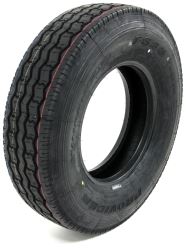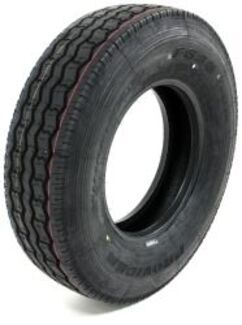
Why are Manufacturer Tire Capacities Rated Lower than Fifth Wheel Trailer Load
Question:
Ha, after having a blowout on my fifth wheel I start looking into new tires . Upon further investigation I find out that the tires that were on my fifth wheel from the factory or underrated and will not support the weight of my camper. Empty weight is 13100 lbs, The tires only support 12320. Gross weight 15500, and the wheels only rated for 12800. How do the manufactures get away with this? Seems like a major liability to me?
asked by: Ryan
Expert Reply:
Weight distribution for trailer tires, and especially fifth wheel tires, works a little bit differently than with a traditional vehicle. Because about 15%-20% of your trailer weight is (usually) on your hitch with a fifth wheel trailer, trailer tires don't have to support the entire load on their own. Because of this, it's actually quite common for manufacturers to install tires of a lower load range on fifth wheel trailers.
There are also several factors that could cause tire failure besides overloading their weight capacity. For instance, if a tire is inflated to more or less than its maximum air pressure (which will be listed on the sidewall of the tire), this can cause tire failure. Inflating tires to a lower air pressure than the maximum reduces the amount of weight that the tire can handle, which can cause the tire to fail if a heavier load is placed on the trailer.
Your maximum tire speed will also be listed on the tire, so it's important to heed this speed limit (many Special Trailer tires are only rated for speeds up to 65 mph). Higher speeds cause heat to build up in the tire, which results in tire fatigue and failure.
Assuming you are within the weight capacity of your tires and that you are travelling within the tire speed limits, you might check for any unusual tire wear, such as wear only on the inside of the tire or flat spots. It's possible that the axles aren't perfectly aligned with the trailer frame, which can cause the tires to drag slightly while towing. A spindle or axle might be bent, which can cause unusual tire wear, or possibly the spindle nut is torqued too tight, which can cause the bearings and hub to bind and heat up.
If you would like to send me your tire size, I will be happy to make a recommendation for new tires. I'm also including a link to our tire and wheel product list as well as a tire FAQ article for you.

Product Page this Question was Asked From
Provider ST235/85R16 Radial Trailer Tire - Load Range G
- Trailer Tires and Wheels
- Tire Only
- Radial Tire
- Load Range G
- 235/85-16
- 16 Inch
- M - 81 mph
- Taskmaster
more information >
Featured Help Information
Miscellaneous Media

Continue Researching
- Q&A: Does HBA-CAM Adapter Module for Hydrastar Electric Over Hydraulic Brake Actuators have 2 or 4 Wires
- Q&A: How Many Transfer Switches are Needed to Switch from Shore Power to a Genreator, and An Inverter?
- Q&A: Replacement Keys and Lock Cores For a Rhino-Rack Zenith Rooftop Cargo Box
- Article: What is Overlanding? How to Start your Overlanding Journey
- Article: Replacement Automotive Lighting
- Q&A: Wiring Instructions For The Furrion Automatic Transfer Switch
- Article: Most Popular Wheel Bearings
- Q&A: Replacement Trailer Wheel for Dexstar Wheel 17-293
- Q&A: Selection of Special Trailer Tires for 5th Wheel Trailer to Avoid Blowouts
- Q&A: Will Swagman Bike Rack Fit Spare Tire with Hard Plastic Cover
- Article: RV Cell Boosters, How Do They Work?
- Article: 7 Common Questions Everyone Has About Trailer Tires
- Article: Trailer Maintenance Schedule
- Article: Brake Controller 7- and 4-Way Installation Kit (ETBC7)





